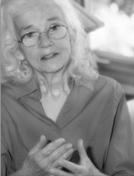AARP Hearing Center
Editor's Note: Dick's life in an ALF parallel's his wife's life in an Alzheimer's Facility. His feelings about his wife will appear for several weeks in his poems and essays.
When I first got here, I heard Richie’s voice every day. Dear Richie. I called him Richie. His real name is Richard, I think. We’d been married a long, long time.

Each morning, Richie came into the kitchen where I was staying. One of the nice girls had walked me to the table. Richie had his Starbucks cup with him. The girl sat me at the table, where I watched Richie make breakfast for me. First though, he put his coffee in the micro; then he poured corn flakes into a bowl for me. He even scooped scrambled eggs from the warmers into a plate for me. He brought it all to the end of the long table. Then he got his coffee and came back to me. We sat at our own corner, together. It was just like it used to be at home. We talked while he fed me and drank his coffee. He told me what he was going to do today. I told him it was nice he came to see me, ‘cause I missed him and being home. Before he left, he hugged and kissed me and told me he would see me tomorrow. He always came back next morning.
I always wanted to ask Richie why he put me here. I never did. Or, maybe I did. I don’t remember. It really wasn’t nice of him to leave me alone in this strange place: all these weird people – some always crying, or babbling, walking around singing, feeding doll babies; even coming into my room. I don’t do any of that stuff, and didn’t before. At home, I just forgot things, like where’s the kitchen? Which burner is on? Where I put my keys? Why were they in the fridge? Or how to do things, like how to get dressed, take a shower, or wipe myself.
Sure, I used to leave the house and go on long walks, but friends brought me home . . . once a nice police lady took me home in her car. Richie was very scared.
I guess he came every day to see if I was still here. . . and to give me breakfast.
One day, he didn’t come. Then he didn’t come again. And again. And again. Why didn’t he come? None of the girls told me anything.
I guessed. Did he get sick? Did he go to the hospital? Fall off his bike? Then suddenly I said something crazy. The girls said I suddenly said, “Richie didn’t die in the awful crash.” Why did I say that? What’s that about? Where is he? Why doesn’t he come back to me? Where is he? No one said squat.
I stopped walking. The girls took turns pushing me in a wheelchair. They took me to the long table to eat. They fed me. They wheeled me into the big room and lifted me into a lie back chair and put my feet up. I always fell asleep.
Then one day when I was sleeping, I heard Richie’s voice. I always could tell his voice. I heard it on the radio for a long time.
“Ginny. Ginny. Hi Gin. It’s me.”
I was lying back in the chair. I squinted and tried to see him standing above me and looking down at me. He wasn’t there. His voice sounded funny. It came from low down, like near my ear. Then it came from my other ear. I heard the squeak of wheels, like when I was pushed in the wheelchair. What’s this all about? His voice should be from high up. He should be standing and talking down. I raised my neck to see him, but my eyes were sticky, with crumbs in them.
Then he kind of yelled. “Look at me Gin. Do you hear me?”
“You are my sunshine; my only sunshine. . . “ He was singing. The song he always sang as I was trying to fall asleep “. . . you make me happy when skies are gray . . . .”
“Don’t you remember?” he sobbed.
Yes, I do. And I hear you speaking to me. You don’t think I do. But I do. I hear everything. That’s why I raise my eyebrows. I want to tell you. But I only can make a noise. Why can’t I talk? Keep coming to see me. I love you. I love you. I need you to be with me. I need to feel you. So touch me and rub me and kiss my face and head. It’s so sad when I hear you say that I don’t recognize you. And don’t hear you. I DO! I CAN HEAR YOU. . . .”RRRRRRR!”































































